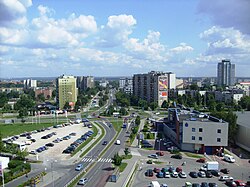Tychy
| Tychy | |||
|---|---|---|---|
 |
|||
|
|||
| Motto: Tychy - a good place | |||
| Coordinates: 50°08′N 18°59′E / 50.133°N 18.983°E | |||
| Country | Poland | ||
| Voivodeship | Silesian | ||
| County | city county | ||
| Established | 15th century | ||
| Town rights | 1951 | ||
| Government | |||
| • Mayor | Andrzej Dziuba | ||
| Area | |||
| • City | 81.64 km2 (31.52 sq mi) | ||
| Population (2013) | |||
| • City | 129,322 | ||
| • Density | 1,600/km2 (4,100/sq mi) | ||
| • Urban | 2,746,000 | ||
| • Metro | 4,620,624 | ||
| Time zone | CET (UTC+1) | ||
| • Summer (DST) | CEST (UTC+2) | ||
| Postal code | 43-100 to 43-135 | ||
| Area code | +48 32 | ||
| Car plates | ST | ||
| Website | http://www.umtychy.pl/ | ||
Tychy [ˈtɨxɨ] (former German: Tichau) is a city in Silesia, Poland, approximately 20 kilometres (12 mi) south of Katowice. Situated on the southern edge of the Upper Silesian industrial district, the city borders Katowice to the north, Mikołów to the west, Bieruń to the east and Kobiór to the south. The Gostynia river, a tributary of the Vistula, flows through Tychy.
Since 1999 Tychy has been located within the Silesian Voivodeship, a province consisting of 71 regional towns and cities. Tychy is also one of the founding cities of the Metropolitan Association of Upper Silesia, a pan-Silesian economic and political union formed with the eventual aim of bringing the most populous Silesian areas under a single administrative body.
Tychy is well known for its brewing industry and its international developed brand Tyskie, which dates back to the 17th century. Since 1950 Tychy has grown rapidly, mainly as a result of post-war socialist planning policies enacted to disperse the population of industrial Upper Silesia.
The moniker Tychy is derived from the Polish word cichy, meaning "quiet" or "still". Although appropriate for most of Tychy's history, the name is now somewhat ironic considering the growth of the city from 1950 onwards.
Originally established as a small agricultural settlement on the medieval trade route between Oświęcim and Mikołów, Tychy was first documented in 1467. In 1629 the first trace of serious economic activity was recorded in the shape of the Książęcy Brewery, which is now one of the largest breweries in Poland.
From 1526 onwards the area on which Tychy is built was part of the Austrian Habsburg Monarchy. This situation came to an end when Prussia forcibly took the land in 1742, before itself becoming part of the German Empire between 1871 and 1918. For a short period between 1918 and 1921 Tychy was just inside the border of the newly formed Weimar Republic and still a part of the German Province of Silesia, only securing its place within the Second Polish Republic after the armed Silesian Uprisings (1919 to 1921).
...
Wikipedia



